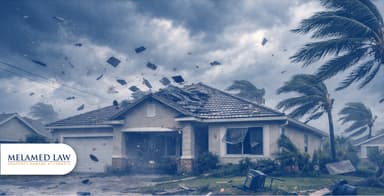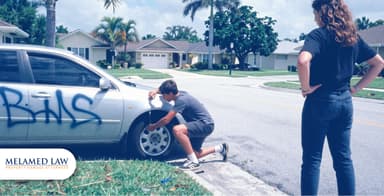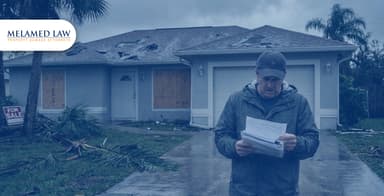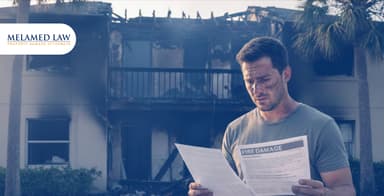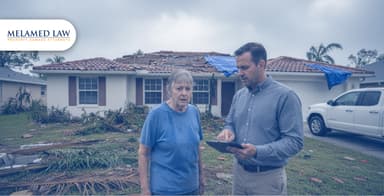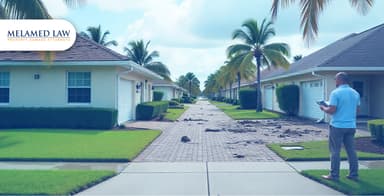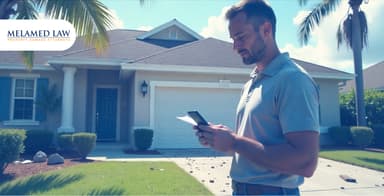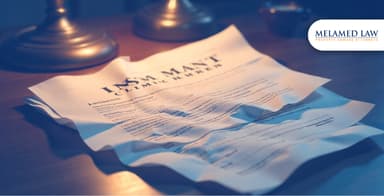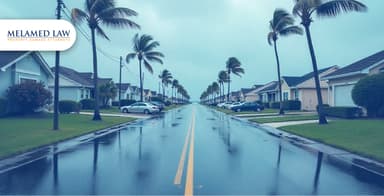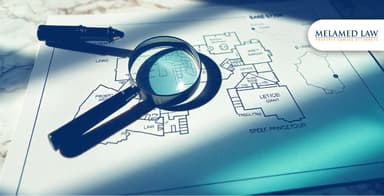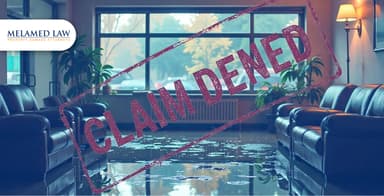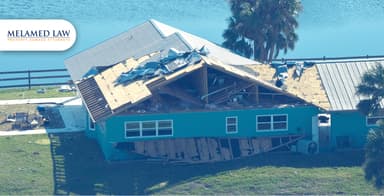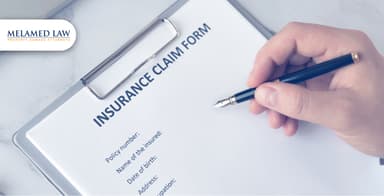
How Business Owners in Florida Can File Property Damage Insurance Claims
When the unexpected happens, we help individuals and businesses collect the money they deserve for their insurance claims.
Property Damage
October 21, 2025
How Business Owners in Florida Can File Property Damage Insurance Claims

When the storm clears, the silence often feels heavier than the chaos that came before. For Florida business owners, it is the morning after that cuts deepest, when shattered glass, flooded floors, and ruined inventory turn familiar spaces into scenes of loss. The doors stay locked, employees wait for answers, and customers move on.
Insurance should be the safety net in these moments, the promise that years of effort will not vanish overnight. Yet the process of filing a property damage claim is rarely simple. Policies are dense, deadlines are strict, and one misstep can cost thousands.
The question is, will your claim carry you back to stability, or will it leave you stranded when you need it most?
1. The First Steps to Take When Your Business Property Is Damaged
Even before you call your insurance agent, certain actions can make or break the strength of your claim. These early steps are not only about clean up or control, they are the foundation for recovery.
Immediate safety measures for staff and property
No owner wants more losses piled upon the first disaster. Prioritize life first, evacuate personnel if structural damage or electrical hazards are present. Secure the site, shut off utilities, cover broken windows, and stabilize roof damage with tarps.
These actions prevent further harm and are legally expected under most policies. Failing to mitigate further damage could reduce your payout. According to the Florida law, policyholders are required to make emergency repairs to protect property from further damage and keep receipts.
Why documenting the damage from day one matters
Photos may feel like extra work when walls are cracked and ceilings sag, however they often become evidence that decides whether your insurer acknowledges the full scope of damage.
High quality, timestamped images both inside and outside, video walkthroughs, and detailed notes establish what was there before any cleanup or repair begins. Poor documentation is one of the leading causes of underpayment or outright denial.
Quick actions that protect your right to file a claim
Notify your insurer immediately, even if you are still assessing damage. Florida law requires claim acknowledgement within 14 days of notice.
Retain all invoices, contracts, proof of ownership or maintenance. Records of repairs, upgrades, and maintenance history will establish prior conditions and make your losses appear more credible.
Do temporary repairs only as needed to stop further damage, and document everything before you touch anything. If you cover a hole, take “before” photos. Emergency repairs are usually reimbursable, while permanent fixes before the insurer’s inspection may invalidate parts of the claim.
Taken together, these steps do more than protect your rights, they signal to your insurer that you are prepared and serious. Once you have secured safety, captured the damage, and formally opened the claim, you move into the territory where the insurer itself takes action, including adjuster inspection, loss estimates, and coverage interpretation, which we will explore in the next section.
2. Understanding What Your Insurance Policy Really Covers
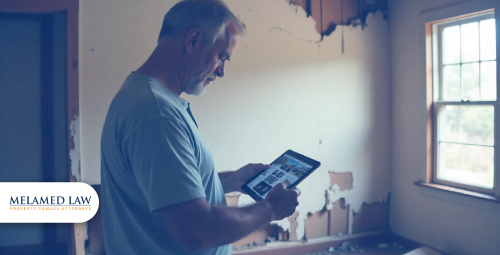
Peering into an insurance policy often feels like deciphering complex language however knowing what is truly covered can mean recovering your business instead of facing losses alone. Understanding these details can save thousands and prevent surprise gaps after damage occurs.
Breaking down common commercial property coverage
Most Florida business owners choose either a Business‑Owners Policy (BOP) or a Commercial Package Policy (CPP) to protect their building, equipment, furniture, inventory, signage, and fixtures from named perils such as fire, theft, storms, or vandalism.
All‑risk policies cover every peril that is not explicitly excluded. CPP and BOP are the most common forms providing commercial property coverage.
Key exclusions Florida business owners often overlook
Standard policies usually exclude flood damage while water damage from events like burst pipes or roof leaks caused by covered perils is included. Distinguishing between flood and covered water damage is crucial, especially after hurricanes. Experts note that even minimal water intrusion can cause repair costs exceeding $25,000.Why reviewing your policy early matters
Policies include endorsements, deductible percentages, coinsurance clauses, and ordinance or law upgrades. A high windstorm deductible could require paying 2 to 10% of the insured value out of pocket.
Early review ensures you understand what is covered, whether building or contents are fully insured, and if business interruption coverage is included. Rising construction costs in Florida have increased replacement cost estimates by 30 to 50% in some areas.
Understanding your coverage and exclusions allows you to plan documentation accurately, avoid underpayment, and prepare for adjuster evaluation, which is the next step we will explore.
3. Effective Ways to Document Damage So Your Claim Stands Strong

When disaster strikes, your documentation becomes the backbone of your insurance claim. The quality and thoroughness of your records can be the difference between a swift settlement and a prolonged dispute.
Creating a photo and video log with timestamps
Visual evidence is paramount. Capture wide-angle shots to show the full extent of the damage, and close-ups to highlight specific issues. Ensure that each photo is time-stamped to establish a clear timeline.Keeping receipts for repairs and temporary fixes
Any expenses incurred for emergency repairs or temporary fixes should be documented meticulously. Retain all receipts and invoices, as these can be reimbursed under your policy.
For instance, if you had to hire a contractor for immediate repairs, the costs associated with their services are typically covered.
Documenting business interruption losses
Business interruption claims require detailed records to substantiate the loss of income. Maintain comprehensive financial statements, including profit and loss statements, payroll records, and sales data.
These documents should reflect the period of disruption and compare them to normal operating periods to highlight the impact.
Mistakes to avoid when describing the cause of damage
Accuracy is crucial when detailing the cause of damage. Avoid speculative language; stick to facts and observations. For example, instead of stating "the roof might have leaked," specify "the roof leaked during the storm on [date]." Misstatements can lead to delays or denials of your claim.
Proper documentation both supports your claim and expedites the process. In the next section, we will explore how to engage with adjusters and navigate the evaluation process to ensure a fair settlement.
4. Filing the Claim Without Falling Into Costly Mistakes

Filing an insurance claim can feel overwhelming, especially when your business is already facing the aftermath of property damage. However, understanding the correct steps and common pitfalls can help you navigate this process more effectively.
Step-by-step filing process, from contacting your insurer to recording the claim number
Initiate the claims process promptly by notifying your insurance company. Provide essential information, including your name, policy number, and a detailed description of the damage.
Ensure you receive a claim number and keep a record of all communications. According to the Florida Department of Financial Services, insurers are required to acknowledge receipt of a claim within 7 days.
What to say, and what not to say, when reporting damage
When reporting the damage, stick to the facts. Describe the events leading up to the damage without speculation. Avoid admitting fault or making statements that could be construed as an admission of liability. Misstatements can lead to delays or denials of your claim.How long insurers legally have to respond in Florida
In Florida, insurers must acknowledge receipt of a claim within 7 days. After receiving a complete proof-of-loss statement, they have 30 days to begin investigating the claim.
A decision on the claim must be made within 90 days. If the insurer fails to settle the claim within 60 days, they may be required to pay interest on the amount due.
Understanding these steps and timelines can help you manage your expectations and ensure a smoother claims process.
Trust Melamed to Protect Your Business Recovery
Facing property damage in Florida can feel like the ground has shifted beneath your business. The paperwork, inspections, and negotiations with insurers are overwhelming, and every decision matters. That is where Melamed steps in. With years of experience guiding business owners through complex claims, their team ensures that no detail is overlooked, from documenting damage to negotiating fair settlements. They fight to secure the recovery your business deserves, so you can focus on reopening doors, keeping employees, and serving customers.
Contact Melamed today for a consultation and take the first step toward a strong, fully supported insurance claim.
Recent Cases


